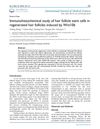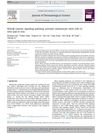Narrowband UVB Treatment Induces Expression of WNT7B, WNT10B, and TCF7L2 in Psoriasis Skin
May 2019
in “
Archives of Dermatological Research
”

TLDR Narrowband UVB treatment increases certain gene expressions in psoriasis skin and improves symptoms.
The study investigated the expression of certain genes (WNT7B, WNT10B, WNT16, and TCF7L2) in the skin and blood of 170 patients with chronic plaque psoriasis and compared it to 365 healthy controls. It found that the expression of WNT7B, WNT10B, and TCF7L2 was significantly lower in the psoriatic skin than in non-lesional skin or skin from healthy individuals. However, after an average of 21 sessions of narrowband UVB treatment, there was a significant increase in the expression of these genes in the psoriatic skin, along with an average 70% improvement in the Psoriasis Area and Severity Index scores. The study did not find a significant association between gene polymorphisms and psoriasis. The results suggest that WNT signaling may be involved in the development of psoriasis and that narrowband UVB treatment may work by affecting these pathways. The study had limitations, including a small sample size for some analyses and demographic differences between patients and controls. Further research is needed to clarify the role of WNT signaling in psoriasis.




